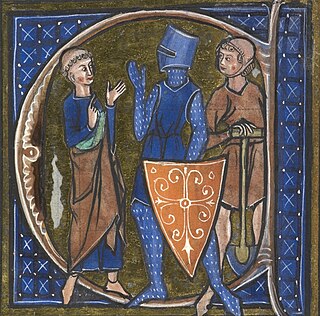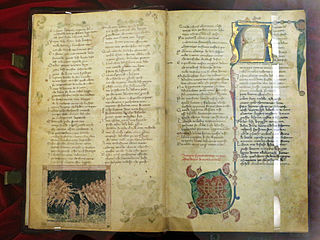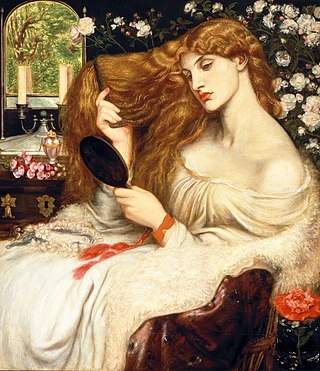
Dante Alighieri, most likely baptized Durante di Alighiero degli Alighieri and widely known and often referred to in English mononymously as Dante was an Italian poet, writer, and philosopher. His Divine Comedy, originally called Comedìa and later christened Divina by Giovanni Boccaccio, is widely considered one of the most important poems of the Middle Ages and the greatest literary work in the Italian language.

Gentleman is a term for a chivalrous, courteous, or honorable man. Originally, gentleman was the lowest rank of the landed gentry of England, ranking below an esquire and above a yeoman; by definition, the rank of gentleman comprised the younger sons of the younger sons of peers, and the younger sons of a baronet, a knight, and an esquire, in perpetual succession. As such, the connotation of the term gentleman captures the common denominator of gentility ; a right shared by the peerage and the gentry, the constituent classes of the British nobility.

La Vita Nuova or Vita Nova is a text by Dante Alighieri published in 1294. It is an expression of the medieval genre of courtly love in a prosimetrum style, a combination of both prose and verse.

Sloth is one of the seven deadly sins in Catholic teachings. It is the most difficult sin to define and credit as sin, since it refers to an assortment of ideas, dating from antiquity and including mental, spiritual, pathological, and conditional states. One definition is a habitual disinclination to exertion, or laziness. Views concerning the virtue of work to support society and further God's plan suggest that through inactivity, one invites sin: "For Satan finds some mischief still for idle hands to do.".

Guido Cavalcanti was an Italian poet. He was also a friend and intellectual influence on Dante Alighieri.

Sonnet 11 is one of 154 sonnets written by the English playwright and poet William Shakespeare. It is a procreation sonnet within the 126 sonnets of the Fair Youth sequence, a grouping of Shakespeare's sonnets addressed to an unknown young man. While the order in which the sonnets were composed is undetermined, Sonnet 11 was first published in a collection, the Quarto, alongside Shakespeare's other sonnets in 1609.

Sonnet 12 is one of 154 sonnets written by the English playwright and poet William Shakespeare. It is a procreation sonnet within the Fair Youth sequence.
Sonnet 41 is one of 154 sonnets written by the English playwright and poet William Shakespeare. It is a part of the Fair Youth section of the sonnets addressed to an unnamed young man. While the exact date of the composition is unknown, it was originally published in the 1609 Quarto along with the rest of the sonnets.
De, also written as Te, is a key concept in Chinese philosophy, usually translated "inherent character; inner power; integrity" in Taoism, "moral character; virtue; morality" in Confucianism and other contexts, and "quality; virtue" or "merit; virtuous deeds" in Chinese Buddhism.

In Dante's Inferno, Satan is portrayed as a giant demon, frozen up to the waist in ice at the center of Hell. Satan has three faces and a pair of bat-like wings affixed under each chin. As Satan beats his wings, he creates a cold wind that continues to freeze the ice surrounding him and the other sinners in the Ninth Circle. The winds he creates are felt throughout the other circles of Hell. In his three mouths, he chews on Judas Iscariot, Marcus Junius Brutus and Gaius Cassius Longinus. Scholars consider Satan to be "a once splendid being from whom all personality has now drained away". Satan, also known as Lucifer, was formerly the Angel of Light and once tried to usurp the power of God. As punishment, God banished Satan out of Heaven to an eternity in Hell as the ultimate sinner. Dante illustrates a less powerful Satan than most standard depictions; he is slobbering, wordless, and receives the same punishments in Hell as the rest of the sinners. In the text, Dante vividly illustrates Satan's grotesque physical attributes.
"London, 1802" is a poem by the English Romantic poet William Wordsworth. In the poem Wordsworth castigates the English people as stagnant and selfish, and eulogises seventeenth-century poet John Milton.
A gentlewoman in the original and strict sense is a woman of good family, analogous to the Latin generosus and generosa. The closely related English word "gentry" derives from the Old French genterise, gentelise, with much of the meaning of the French noblesse and the German Adel, but without the strict technical requirements of those traditions, such as quarters of nobility.
Gualdrada Berti dei Ravignani was a member of the Ghibelline nobility of twelfth-century Florence, Italy. A descendant of the Ravignani family and daughter of the powerful Bellincione Berti, Gualdrada later married into the Conti Guido family. Her character as a pure and virtuous Florentine woman is called upon by many late medieval Italian authors, including Dante Alighieri, Giovanni Boccaccio, and Giovanni Villani.
Piccarda Donati was a medieval noblewoman and a religious woman from Florence, Italy. She appears as a character in Dante Alighieri's Divine Comedy.

Gentry are "well-born, genteel and well-bred people" of high social class, especially in the past. Gentry, in its widest connotation, refers to people of good social position connected to landed estates, upper levels of the clergy, or "gentle" families of long descent who in some cases never obtained the official right to bear a coat of arms. The gentry largely consisted of landowners who could live entirely from rental income or at least had a country estate; some were gentleman farmers. In the United Kingdom, the term gentry refers to the landed gentry: the majority of the land-owning social class who typically had a coat of arms but did not have a peerage. The adjective "patrician" describes in comparison other analogous traditional social elite strata based in cities, such as the free cities of Italy and the free imperial cities of Germany, Switzerland, and the Hanseatic League.

Paradiso is the third and final part of Dante's Divine Comedy, following the Inferno and the Purgatorio. It is an allegory telling of Dante's journey through Heaven, guided by Beatrice, who symbolises theology. In the poem, Paradise is depicted as a series of concentric spheres surrounding the Earth, consisting of the Moon, Mercury, Venus, the Sun, Mars, Jupiter, Saturn, the Fixed Stars, the Primum Mobile and finally, the Empyrean. It was written in the early 14th century. Allegorically, the poem represents the soul's ascent to God.

Lady Lilith is an oil painting by Dante Gabriel Rossetti first painted in 1866–1868 using his mistress Fanny Cornforth as the model, then altered in 1872–73 to show the face of Alexa Wilding. The subject is Lilith, who was, according to ancient Judaic myth, "the first wife of Adam" and is associated with the seduction of men and the murder of children. She is shown as a "powerful and evil temptress" and as "an iconic, Amazon-like female with long, flowing hair."

The Girlhood of Mary Virgin is an 1849 oil on canvas painting by the Pre-Raphaelite Brotherhood painter Dante Gabriel Rossetti, measuring 83.2 by 65.4 cm and now in the collection of Tate Britain, to which it was bequeathed in 1937 by Agnes Jekyll. It was his first completed oil painting and is signed "Dante Gabriele Rossetti P.R.B. 1849". He first exhibited it at the 'Free Exhibition' at the Hyde Park Corner Gallery.

Matelda, anglicized as Matilda in some translations, is a minor character in Dante Alighieri's Purgatorio, the second canticle of the Divine Comedy. She is present in the final six cantos of the canticle, but is unnamed until Canto XXXIII. While Dante makes Matelda's function as a baptizer in the Earthly Paradise clear, commentators have disagreed about what historical figure she is intended to represent, if any.
Nella Donati was a medieval noblewoman from Florence, Italy. She is primarily known because of Dante Alighieri's treatment of her relationship to her husband, Forese Donati, in the Divine Comedy and in a series of poems Dante exchanged with Forese.













